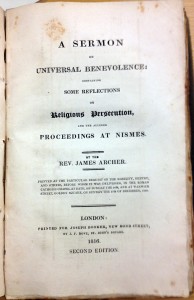[Posted by Claire Shutt (’13), a student in Zak Sitter’s English course, “1816: A Romantic Microcosm”]
 This piece is a sermon entitled “A Sermon on Universal Benevolence: Containing Some Reflections on Religious Persecution and the Alleged Proceedings at Nismes.” Reverend James Archer delivers this sermon. It is published in London in 1816 by Joseph Booker. This is the second edition. Reverend Archer’s sermon is published with a collection of other sermons as well as speeches and minutes, all having to do with Catholicism. Most pieces in this collection have been published within a few years of one another. The binding of the book, a collection of pamphlets, is extremely worn so all that can be made out is “Tracks on Catholic L.” The faded black cursive letters after the L are overlapping and difficult to make out. The spine of the book that holds together this collection is falling apart, so it must be handled with care. The ends of the pages are brown and worn.
This piece is a sermon entitled “A Sermon on Universal Benevolence: Containing Some Reflections on Religious Persecution and the Alleged Proceedings at Nismes.” Reverend James Archer delivers this sermon. It is published in London in 1816 by Joseph Booker. This is the second edition. Reverend Archer’s sermon is published with a collection of other sermons as well as speeches and minutes, all having to do with Catholicism. Most pieces in this collection have been published within a few years of one another. The binding of the book, a collection of pamphlets, is extremely worn so all that can be made out is “Tracks on Catholic L.” The faded black cursive letters after the L are overlapping and difficult to make out. The spine of the book that holds together this collection is falling apart, so it must be handled with care. The ends of the pages are brown and worn.
In this sermon Reverend Archer focuses on benevolence. He beings the sermon by stating that example is more powerful than reasoning and then argues that Jesus is that example. Jesus has fed the hungry and cured the sick, among other good deeds. Reverend Archer believes everyone should learn from Jesus and not only do good themselves but also teach others to do the same. Reverend Archer also makes the point that it is important to attend church. Not only does attending church signal a person supporting Jesus, but it also brings the community together.
After preaching about what is right, Reverend Archer begins to discuss what is wrong. He is extremely adamant that violence is not the answer; violence is wrong. He believes violence contradicts what the Bible says. Therefore, he is very distressed about the ongoing tension between the Protestants and the Catholics. With God as the common denominator, there should be no serious issues between the two denominations, especially no violence. Reverend Archer then circles back to the beginning of his sermon and closes with saying that if a person does not do good in his life, he will spend his final days before death wishing that he did.
Throughout the course of his sermon Reverend Archer quotes parts of the Bible in congruence with his argument. He also mentions a letter written by St. Augustine when is he speaking to the conflict between the Catholics and Protestants.
When I first came across this piece I almost did not stop to read it; religious discourse can be quite tiresome. However, after only two pages I was completely interested. Reverend Archer seemed to have such an open mind about accepting all denominations under the larger umbrella of Christianity, which I liked. The subject of the sermon, being a good person, is also a great topic mostly because it is still applicable today. Though this document is well over a century old, there are still lessons to be learned from it today. I am curious firstly if Reverend Archer was ahead of his time in 1816 with these ideas and secondly if the other parts of this collection share similar ideas to these.